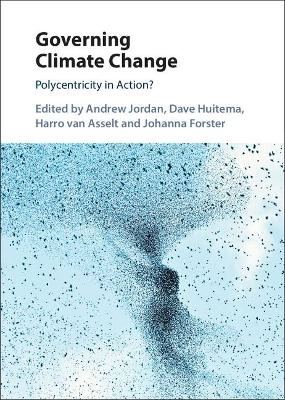
Governing Climate Change
Cambridge University Press (Verlag)
978-1-108-41812-6 (ISBN)
Climate change governance is in a state of enormous flux. New and more dynamic forms of governing are appearing around the international climate regime centred on the United Nations Framework Convention on Climate Change (UNFCCC). They appear to be emerging spontaneously from the bottom up, producing a more dispersed pattern of governing, which Nobel Laureate Elinor Ostrom famously described as 'polycentric'. This book brings together contributions from some of the world's foremost experts to provide the first systematic test of the ability of polycentric thinking to explain and enhance societal attempts to govern climate change. It is ideal for researchers in public policy, international relations, environmental science, environmental management, politics, law and public administration. It will also be useful on advanced courses in climate policy and governance, and for practitioners seeking incisive summaries of developments in particular sub-areas and sectors. This title is also available as Open Access on Cambridge Core.
Andrew Jordan is Professor of Environmental Policy at the Tyndall Centre for Climate Change Research, University of East Anglia. He has published extensively on European Union (EU) and United Kingdom environmental policy and politics, and advised a number of international, EU and UK institutions. He is a co-chair of the Brexit & Environment network, funded by the ESRC's UK in a Changing Europe initiative. He is a member of the Scientific Committee of the European Environment Agency and a Fellow of the Academy of Social Sciences. Dave Huitema is Professor of Environmental Policy at The Open University of the Netherlands, and at the Vrije Universiteit, Amsterdam. He specialises in public policy and environmental governance, focusing on water and climate change specifically. He is a member of the editorial board of the journals Global Environmental Change and Ecology and Society and has authored several books on environmental governance, including Climate Change Policy in the European Union (Cambridge, 2011). Harro van Asselt is Professor of Climate Law and Policy at the University of Eastern Finland (UEF) Law School, and a Senior Research Fellow with the Stockholm Environment Institute (SEI). He is an Editor of Review of European, Comparative and International Environmental Law. He has published widely in journals such as Nature Climate Change, Global Policy, Global Governance, Law & Policy, Regulation & Governance, Climatic Change and Climate Policy. He is the author of The Fragmentation of Global Climate Governance (2014). Johanna Forster is a Senior Research Associate in the School of Environmental Sciences at the University of East Anglia and the Manager of the INOGOV network. She has published on a wide range of topics including climate change impacts and adaptation, environmental economics, and marine management and governance. Her publications include articles in Nature Climate Change, Climatic Change, Global Environmental Change, and Marine Policy.
Part I. Context: 1. Governing climate change polycentrically: setting the scene Andrew Jordan, Dave Huitema, Jonas Schoenefeld, Harro van Asselt and Johanna Forster; Part II. Actors and Domains of Governance: 2. International governance: polycentric governing by and beyond the UNFCCC Harro van Asselt and Fariborz Zelli; 3. National governance: the state's role in steering polycentric action Joana Setzer and Michal Nachmany; 4. Transnational governance: charting new directions post-Paris Harriet Bulkeley, Michele Betsill, Daniel Compagnon, Thomas Hale, Matthew Hoffmann, Peter Newell and Matthew Paterson; 5. City and subnational governance: high ambitions, innovative instruments and polycentric collaborations? Jeroen van der Heijden; Part III. Polycentric Governance Processes: 6. Experimentation: the politics of innovation and learning in polycentric governance Jan-Peter Voß and Fabian Schroth; 7. Entrepreneurship: a key driver of polycentric governance? Elin Lerum Boasson; 8. Leadership and pioneership: exploring their role in polycentric governance Duncan Liefferink and Rüdiger K. W. Wurzel; 9. Diffusion: an outcome of and an opportunity for polycentric activity? Jale Tosun; 10. Linkages: understanding their role in polycentric governance Philipp Pattberg, Sander Chan, Lisa Sanderink and Oscar Widerberg; 11. Orchestration: strategic ordering in polycentric governance Kenneth W. Abbott; 12. Policy surveillance: its role in monitoring, reporting, evaluating and learning Joseph E. Aldy; Part IV. Substantive Governance Challenges: 13. Harnessing the market: trading in carbon allowances Katja Biedenkopf and Jørgen Wettestad; 14. Decarbonisation: the politics of transformation Steven Bernstein and Matthew Hoffmann; 15. Transferring technologies: the polycentric governance of clean energy technology Liliana B. Andonova, Paula Castro and Kathryn Chelminski; 16. Governing experimental responses: negative emissions technologies and solar climate engineering Jesse Reynolds; 17. Adaptation: the neglected dimension of polycentric climate governance? Robbert Biesbroek and Alexandra Lesnikowski; 18. Equity and justice in polycentric climate governance Chukwumerije Okereke; 19. Legitimacy and accountability in polycentric climate governance Karin Bäckstrand, Fariborz Zelli and Philip Schleifer; Part V. Synthesis and Conclusions: 20. Governing climate change: the promise and limits of polycentric governance Andrew Jordan, Dave Huitema, Harro van Asselt and Johanna Forster; Index.
| Erscheinungsdatum | 04.07.2018 |
|---|---|
| Zusatzinfo | Worked examples or Exercises; 9 Tables, black and white; 8 Halftones, black and white; 5 Line drawings, black and white |
| Verlagsort | Cambridge |
| Sprache | englisch |
| Maße | 177 x 250 mm |
| Gewicht | 890 g |
| Themenwelt | Naturwissenschaften ► Biologie ► Ökologie / Naturschutz |
| Naturwissenschaften ► Geowissenschaften ► Meteorologie / Klimatologie | |
| Recht / Steuern ► EU / Internationales Recht | |
| Recht / Steuern ► Öffentliches Recht ► Umweltrecht | |
| Sozialwissenschaften ► Politik / Verwaltung ► Europäische / Internationale Politik | |
| Wirtschaft ► Volkswirtschaftslehre | |
| ISBN-10 | 1-108-41812-0 / 1108418120 |
| ISBN-13 | 978-1-108-41812-6 / 9781108418126 |
| Zustand | Neuware |
| Haben Sie eine Frage zum Produkt? |
aus dem Bereich


